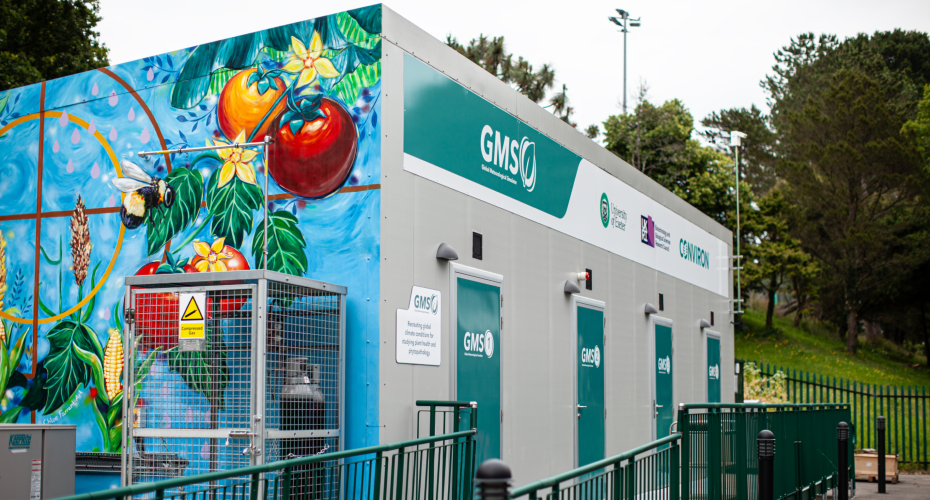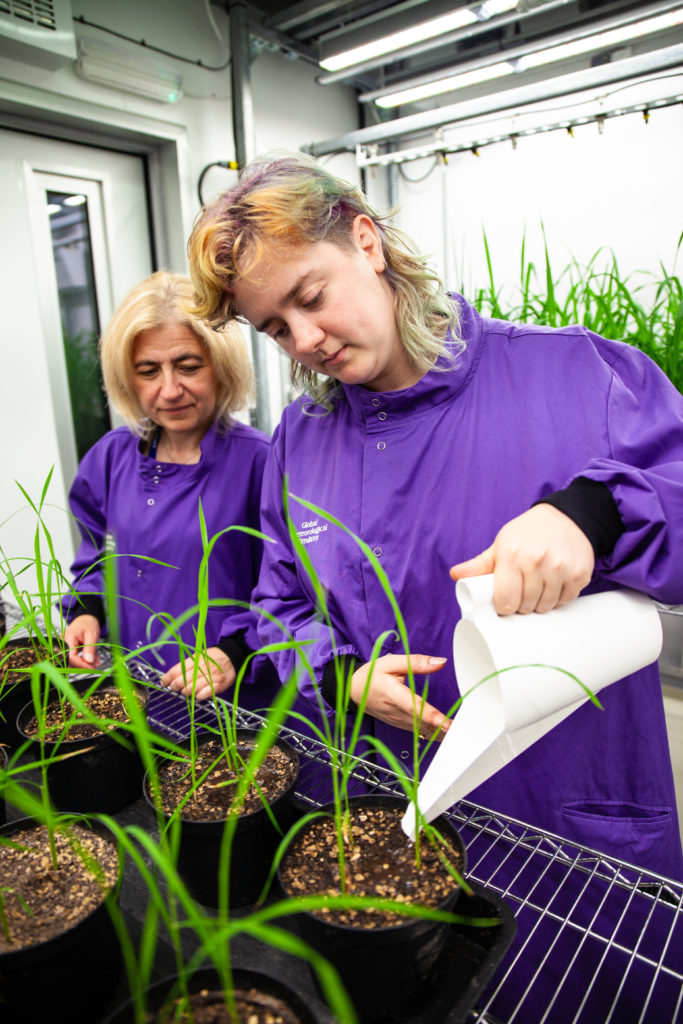Pioneering facility allows researchers to replicate wind and rain to study climate impact on plants

New advanced plant growth chambers at the University of Exeter will help scientists recreate climate conditions including wind and rain to advance research into global food security problems.
The new facility aims to boost plant research to address an urgent global crisis. More than ten years ago, the United Nations issued the stark warning that we need to double global food production by 2050 to meet demands from the world’s growing population. Serious obstacles to achieving this goal include crop pathogens, pests and a global decline in pollinators.
For the first time, the new facility will enable university researchers to recreate weather conditions including wind and rain in a controlled environment, which has so far been challenging. It will also be available to the global research community who want to control more variables that impact plant growth to replicate what really happens in nature.
Known as the Global Meteorological Simulator (GMS), the facility is one of just a few in the world and thought to be the only one of its kind in a university setting. Funded by the Biotechnology and Biological Sciences Research Council (BBSRC) and the University of Exeter, the new plant growth chambers will mimic current and future weather simulations from around the world. The GMS consists of four separate chambers each containing different plants – so a tropical storm might rage in one, while cool mist fills another.
Scientists will use the £1.5 million simulator to study plant diseases, investigating how weather conditions affect plants, and their pollinators, pests and disease-causing microbes.

Professor Ivana Gudelj, of the University of Exeter, led the application for the project, and will use the new facility in her research on plant pathogens. She said: “Environmental conditions, including wind, rain and humidity, play a key role in plant health and disease. Field studies allow us to observe plants in their natural conditions, yet these are hard to control, meaning we can struggle to replicate our results, which is crucial to robust science. Other classical controllable growth facilities cannot accurately replicate such a diverse range of natural environmental conditions.
“Our cutting-edge new simulator means we can manipulate and generate all kinds of conditions to get a much clearer idea of how our research will really play out in the natural environment. The Global Meteorological Simulator fills a gap in UK science capacity, enabling UK researchers working on plant health and disease to undertake truly groundbreaking research.”
The GMS will be available to researchers and industry experts beyond the University of Exeter, to help enable access to advanced research equipment and national expertise. Research questions addressed in the plant growth chambers may include: how plants react to predicted future global climate; how plant diseases are transmitted by rain splashing onto leaves; understanding ways to improve our ability to forecast the spread of disease outbreaks; and how weather and climate affects the behaviour of pollinators, which are vital for fruit and vegetable cultivation.
The GMS was funded through the BBRSC’s ALERT infrastructure funding scheme. Dr Tim Shuttleworth, Head of Research Infrastructure at BBSRC said: We’re delighted to see this cutting-edge facility begin operation, and we look forward to the interdisciplinary collaborations it will foster and the insights it will deliver into the impacts of climate on plant health and disease.”
Ryan Popilchak, President of Conviron and Argus Controls that developed the GMS, remarked: “Conviron and Argus are incredibly proud to serve as the technology partner for the University of Exeter on one of our most innovative and unique plant growth facilities anywhere in the world. At Conviron and Argus Controls, we deeply value the role of plant science in addressing today’s environmental and food security challenges and we are excited that these new chambers will help accelerate the discovery process for years to come.”
Professor Lisa Roberts, President and Vice Chancellor of the University of Exeter said: “Our new Global Meteorological Simulator is a major step forward in the University’s ability to discover how changing conditions will affect plants, and therefore crop production.
“We pride ourselves on our research impact in this field, and we’re firmly committed to leading meaningful action against the climate emergency and ecological crisis. This exciting new facility will allow our researchers to identify threats and develop vital solutions to ensure a healthy and sustainable future.”
How researchers will use the new plant growth chambers:
The effect of weather and climate change on crop disease
By generating wind, rain and fogging conditions, the plant growth chambers will be vital for progressing understanding of how crop diseases transmit amongst plants such as wheat, banana, coffee, rice, potatoes and maize. This can be done by enabling the physical movement of spores between hosts and mimicking dew formation that induces the pathogen to initiate infection. This will also allow scientists to test how long microbes that are used for disease treatment might survive in the real world, in changing weather conditions.
How multiple environmental factors affect plant growth and development and risk of disease
The plant growth chambers will allow scientists to rigorously test the performance of crops modified to better resist pests and pathogens in realistic fluctuating environmental conditions, including wind and rain. This approach will greatly improve discovery of genetic traits which will increase crop productivity in real and future global environments.
Understanding large-scale dynamics of algae in controlled environments
So far, it has generally only been possible to study swimming algae in controlled environments on a microscopic scale. The simulator will allow stable, large-scale behavioural set-ups to visualise and record the complex dynamics of algae and how they respond to changing weather conditions.
The effect of weather on plant-pest interactions
The GMS will allow researchers to systematically assess how genetic and meteorological factors interact to influence pesticide resistance. Since atmospheric conditions such as temperature, wind speed and direction are thought to be particularly important for migrant insects, the simulator will enable these factors to be investigated in a controlled, replicated manner.
How does climate change influence pollinator behaviour?
The plant growth chambers enable an in-depth, repeatable and controlled examination of the effects of rain, temperature and humidity, as well as the scale of less studied types of road “pollution”, on floral resources and bee behaviour. This will allow for better predictions of foraging efficiency and bee survival under changing conditions.



